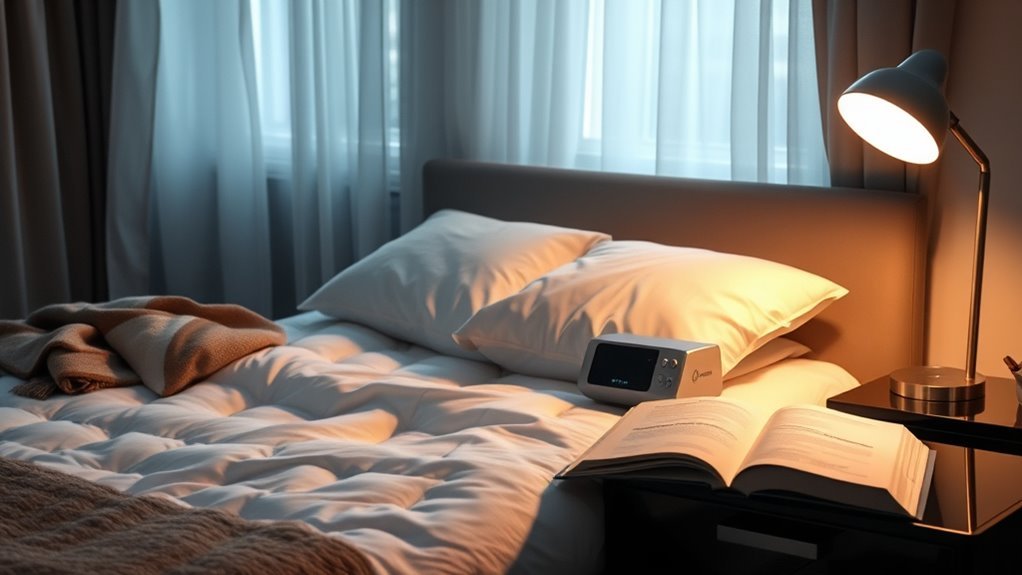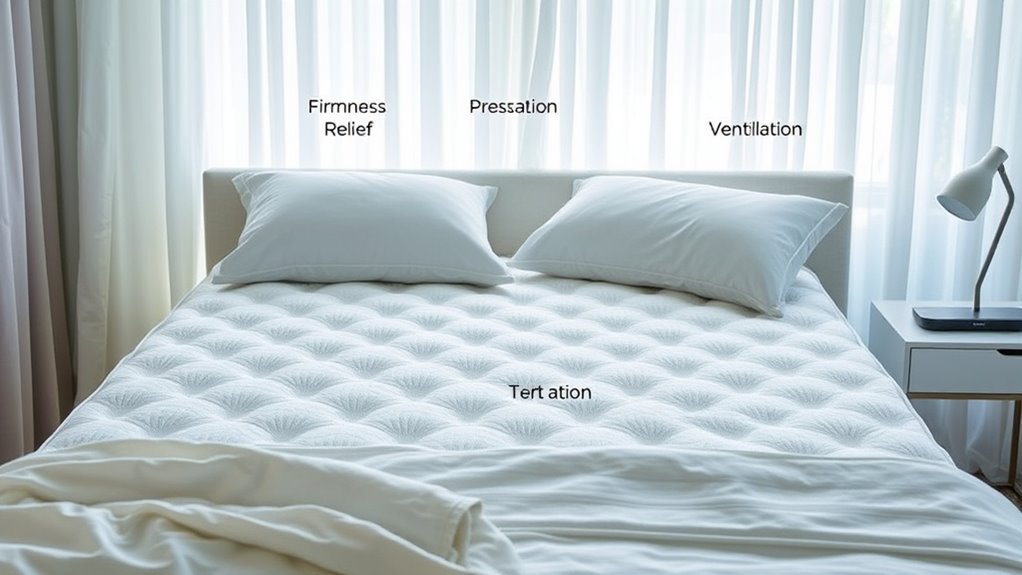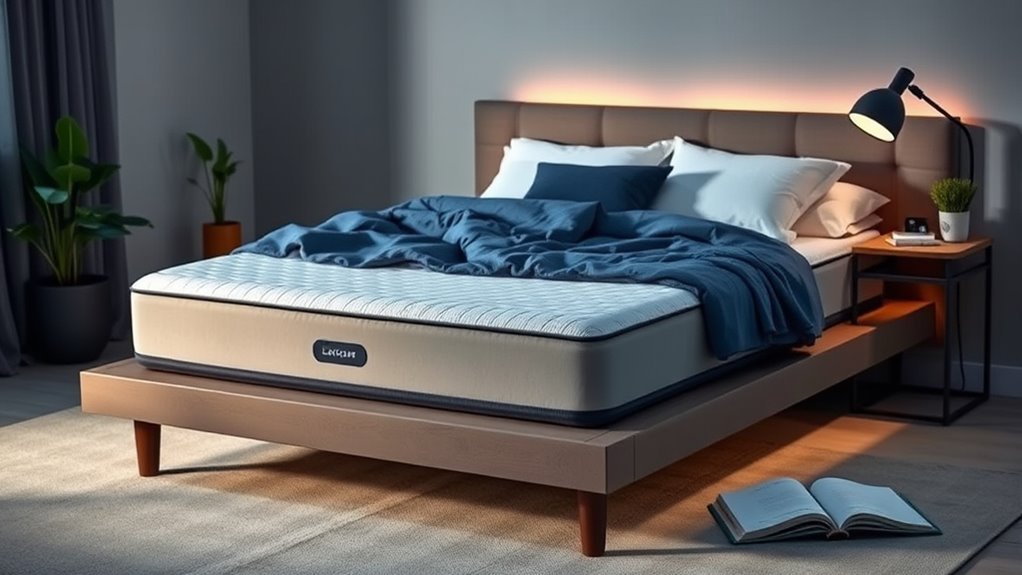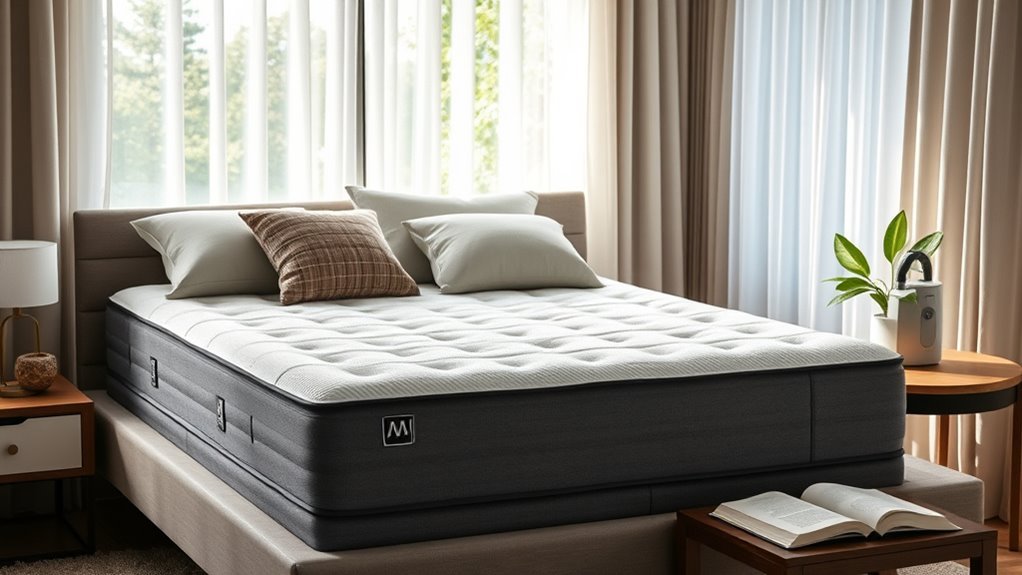Finding a mattress that supports sleep apnea is essential for improving your sleep quality. Look for medium-firm options that provide proper alignment and pressure relief, like memory foam or hybrid mattresses. Your sleep position matters too; side sleepers need a softer feel, while back sleepers benefit from firmer support. Don’t forget to take into account accessories like wedge pillows and adjustable bases to enhance your comfort further. If you keep exploring, you’ll discover even more ways to optimize your sleep experience.
Understanding Sleep Apnea and Its Impact on Sleep Quality

Understanding sleep apnea is crucial, especially since it can greatly disrupt your sleep quality. This condition often arises from various causes, such as obesity, anatomical issues, or even lifestyle choices. You might experience symptoms like loud snoring, gasping for air during sleep, or excessive daytime fatigue. These sleep disorders can hinder your ability to feel rested and free during your waking hours. It’s important to acknowledge how sleep apnea affects not just your nights but your overall well-being. Recognizing these symptoms can empower you to seek appropriate treatment and take control of your health. By addressing the root causes of sleep apnea, you can reclaim your sleep quality and enjoy the freedom that comes with restorative rest.
Key Features to Look for in a Mattress

When selecting a mattress to support sleep apnea, it’s essential to prioritize features that enhance comfort and promote proper alignment. Look for a mattress firmness that suits your sleeping position; medium-firm options often provide the balance of support and comfort. This can help maintain spinal alignment, reducing the risk of airway obstruction. Additionally, consider materials that offer pressure relief, as they can alleviate discomfort during the night. Memory foam and latex are excellent choices, contouring to your body while distributing weight evenly. Finally, a breathable mattress can help regulate temperature, ensuring a more restful sleep. By focusing on these key features, you can create a sleep environment that supports your health and freedom from sleep apnea symptoms.
Mattress Types and Their Benefits for Sleep Apnea

Choosing the right mattress type can greatly impact your experience with sleep apnea. Memory foam mattresses are a popular choice as they conform to your body, providing excellent pressure relief and support. This can help alleviate discomfort and promote better breathing during sleep. They also minimize motion transfer, so if you share your bed, you won’t be disturbed by movement.
On the other hand, hybrid mattresses combine the benefits of memory foam and innerspring coils. They offer the contouring support of foam with the added bounce and airflow from coils, ensuring a cooler sleep experience. Both options can considerably enhance your overall comfort and support, ultimately contributing to a more restful night and improved management of sleep apnea symptoms.
Importance of Sleep Position and Its Influence on Mattress Choice
Since your sleep position can greatly affect your comfort and breathing, it’s essential to take it into account when selecting a mattress for sleep apnea support. For instance, if you’re a side sleeper, you’ll want a mattress that offers sufficient softness to cushion your shoulders and hips, while still maintaining the right firmness to keep your spine aligned.
Here’s a quick reference table to guide your mattress choice:
| Sleep Position | Ideal Firmness | Benefits |
|---|---|---|
| Side Sleeping | Medium-Firm | Alleviates pressure points |
| Back Sleeping | Firm | Supports natural spine curve |
| Stomach Sleeping | Soft to Medium | Reduces neck strain |
| Combination | Adjustable | Versatile for various positions |
| Overall | Personalized | Tailored to individual needs |
Choosing wisely can enhance your sleep quality and ultimately your health.
Additional Sleep Aids and Accessories for Enhanced Support
While finding the right mattress is essential for managing sleep apnea, incorporating additional sleep aids and accessories can further enhance your overall support and comfort. Here are three items to evaluate:
Finding the right mattress is vital for sleep apnea, but enhancing comfort with sleep aids can make a significant difference.
- Sleep Masks: A good sleep mask blocks out light, helping you achieve deeper, more restorative sleep. This can be particularly beneficial if you’re sensitive to your sleeping environment.
- Adjustable Bases: These allow you to elevate your head and legs, improving airflow and reducing pressure on your airways, making it easier to breathe at night.
- Wedge Pillows: By promoting a more upright sleeping position, wedge pillows can minimize snoring and acid reflux, common issues for those with sleep apnea.
Combining these accessories with your ideal mattress can create a personalized sleep sanctuary.
Frequently Asked Questions
Can Weight Affect My Choice of Mattress for Sleep Apnea?
Yes, your weight can greatly influence your choice of mattress for sleep apnea. Heavier individuals may need a firmer mattress for better weight distribution, which can help maintain spine alignment and reduce pressure points. Materials like memory foam or latex can offer the support you need while contouring to your body. It’s vital to take into account how your weight interacts with different mattress materials to guarantee a restful night’s sleep and improved comfort.
How Often Should I Replace My Mattress if I Have Sleep Apnea?
You should replace your mattress every 7 to 10 years, especially if you have sleep apnea. Studies show that a worn mattress can reduce sleep quality by up to 30%. As you know, a good night’s sleep is essential for managing your condition, so don’t ignore those telltale signs of wear. Keeping your mattress within its lifespan can make a significant difference in how rested and rejuvenated you feel each day.
Are There Specific Brands Recommended for Sleep Apnea Sufferers?
When looking for a mattress as a sleep apnea sufferer, you might consider brands like Tempur-Pedic or Purple, known for their supportive mattress features. Look for options that provide good pressure relief and proper spinal alignment. Brand comparisons can help you find the right fit for your needs. Customer reviews and expert opinions can guide you in making an informed choice, ensuring you get the restful sleep you deserve.
Can a Mattress Be Too Firm for Sleep Apnea Support?
Yes, a mattress can be too firm for sleep apnea support. Firmness levels directly affect your alignment and comfort. If a mattress doesn’t allow for proper contouring, it might lead to increased pressure on your body, potentially worsening sleep apnea symptoms. Look for mattress materials like memory foam or latex, which provide both support and cushioning, ensuring you maintain an open airway while you sleep. Finding the right balance in firmness is essential for restful nights.
Do Mattress Warranties Cover Sleep Apnea-Related Issues?
Unfortunately, most mattress warranties don’t cover sleep apnea-related issues directly. They’re designed to address durability factors like sagging or structural defects. If you feel your mattress isn’t supporting your sleep needs, you might face a tricky warranty claim process. Always check the fine print—some brands might offer extended policies for specific health concerns. Remember, a good night’s sleep is your freedom, so invest wisely in a mattress that truly supports you.



